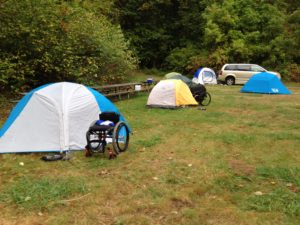
Adaptive Camping Event
This is an example of how systemic barriers can lead to social isolation and poor health in the disability community. Many of the 950,000 Oregonians with disabilities face significant and ongoing challenges. These barriers limit their ability to participate in health-promoting activities. Public health data (BRFSS) shows that people with disabilities in Oregon are more likely to develop chronic and secondary health conditions. Some of this risk comes from the systemic barriers that prevent them from engaging in healthy activities.
Teaming Up for Accessibility
A team of partners and sponsors came together to improve accessibility in Oregon State Parks. Oregon Spinal Cord Injury Connection,
Adventures Without Limits, and the Oregon State Parks Department worked together to plan a special event. The goal was to highlight the strong outdoor spirit within the disability community. It also aimed to raise awareness about the barriers they face in enjoying state parks. Support came from the Health and Outdoor Initiative and the
Oregon Office on Disability and Health at OHSU. The event also received sponsorship from the Oregon State Parks Foundation and Health Share of Oregon. Together, the team hosted an adaptive camping event at Milo McIver Park on September 22–23.

Wheelchairs and tents
Ten members of the Oregon SCI community, along with their families and partners, took part in the event. They also agreed to be filmed throughout the weekend. Normally, you wouldn’t see someone filming during a camping trip. But this time, filming was intentional. The footage will be used to create an educational video. The goal is to support policy recommendations, influence State Parks’ budgets, and advocate for future legislation. This could help increase funding and expand accessible programs in Oregon State Parks.
Keep an eye out for the video!
A Special Thanks to Our Partners
We want to thank all our partners and sponsors for making this event possible. Their support is also making the upcoming video and future systemic change possible. The Oregon State Parks Foundation donated $5,000. Health Share of Oregon contributed $1,000. These generous donations helped cover participant costs. They also funded trained adaptive recreation technicians to assist throughout the weekend. Adventures Without Limits handled all logistics and volunteer coordination. This included setting up and taking down camp, hosting the adaptive kayaking trip, providing camping gear, and cooking meals. Oregon State Parks and the Milo McIver park rangers worked hard to make the site accessible. They leveled surfaces, installed a powerchair charging station, and added a mat table in the restrooms. They also removed benches from several picnic tables to make them wheelchair-accessible and installed an outstanding fire pit. The Health and Outdoors Initiative managed photography, filming, and interviews. They are producing the video. Oregon SCI brought the partners together. They secured funding, recruited participants, and handled all communications.


